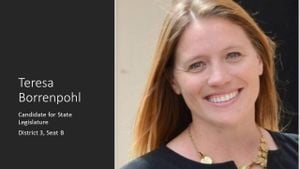The preliminary results of the 2025 federal elections for the electoral district of Flensburg-Schleswig indicated a significant victory for the Christian Democratic Union (CDU), which secured the highest number of votes. The results reflected the complex dynamics of the new electoral laws, which dampen the prediction of winners from the first votes cast.
Petra Nicolaisen of the CDU managed to win the direct candidacy for the district with 26.5% of the first votes, fending off substantial competition from Robert Habeck of the Green Party, who received 22.6%. On the other hand, the Social Democratic Party (SPD), represented by Johanna Selbert, trailed with 14.8%, closely followed by Martin Neubauer from the Alternative for Germany (AfD) at 15.0%. The election saw strong participation from the constituency, with approximately 83.1% of eligible voters casting their ballots.
The CDU's success marks a sharp increase from their previous election results, as they also led the second votes with 24.9%, which is 4.5 percentage points higher than what they achieved in the last federal election of 2021. This was part of broader trends observed across the region, with the AfD experiencing notable gains, increasing their share by 9.5 percentage points to 15.3% among second votes. The SPD faced the steepest decline, dropping 9.6 points to secure just 15.9% of the total.
Considering the new electoral regulations, the outcome remains uncertain for candidates like Nicolaisen. These reforms have introduced mechanisms where the number of direct mandates awarded to parties could be limited, meaning candidates can win the popular vote but still miss out on entering the Bundestag. This will be evident as final counts for the district conclude once all precincts are reviewed.
Analysis of the regional outcomes reveals interesting patterns. Despite Nicolaisen's strong performance, her results within Flensburg itself, at 18.0%, lagged behind her overall district support. Meanwhile, Habeck saw stronger backing within the city than his overall district average, capturing 30.5% of first votes within Flensburg, reflecting localized support strengths.
The significant voter turnout of 83.1% also highlights increased civic engagement compared to previous elections, indicating rising interest levels among constituents. This aligns with nationwide trends, where voter participation increased by over 6 percentage points, reaching 83% on average across Germany.
Voter behavior showcases shifts across several parties: the CDU has certainly capitalized on these dynamics and the reforms to restore some of its earlier influence, contrasting sharply with the challenges faced by the SPD and the Greens, both of whom have lost substantial ground. New contenders like the South Schleswig Voter Association (SSW) and the newly minted BSW have entered the fray, with the latter gaining 3.2% of votes, indicating growing interest from minority parties.
These results reflect the shifting political landscapes within the area of Flensburg-Schleswig and foreshadow potential challenges for longstanding parties, particularly the SPD, which once held dominance here. The ups and downs experienced by these political factions suggest their campaigns and outreach will need considerable recalibration as they address voter concerns and navigate the newly established uncertainties posed by the electoral reforms.
This marks significant historical comparisons, with the last federal election seeing the Greens' Robert Habeck winning the district outright with 28.1% of first votes and the SPD leading overall with 25.5% of second votes. The pendulum swing not only denoted how differently electoral sentiments have shifted but also indicated how voters are gravitating toward other parties, especially as they rally around issues pertinent to local populace interests.
With final results awaited and the potential for recounts if the margins remain slim, the Flensburg-Schleswig district stands as a compelling case study reflecting broader national election trends. The CDU's showing bodes potential for future influence against the backdrop of electoral system reform, and the ramifications of these results will be closely monitored as political strategies evolve heading toward the next electoral cycles.



